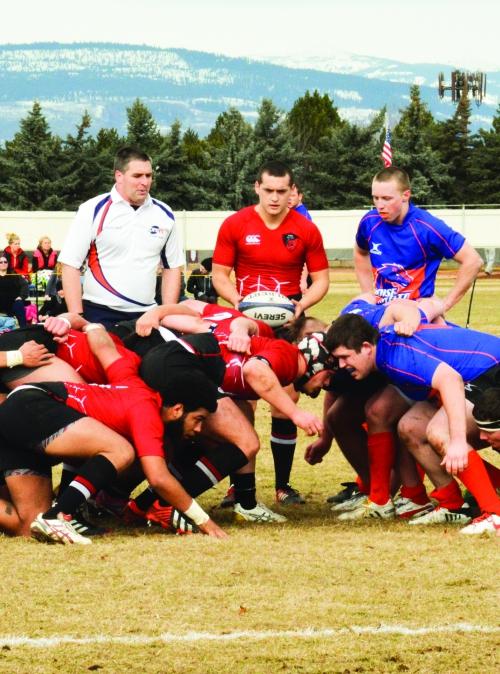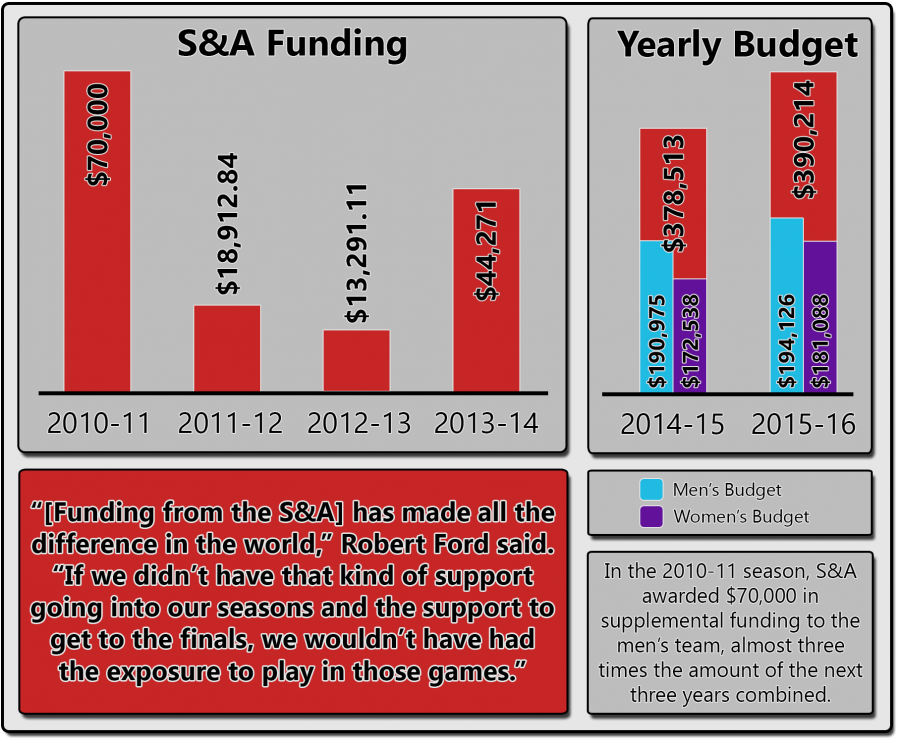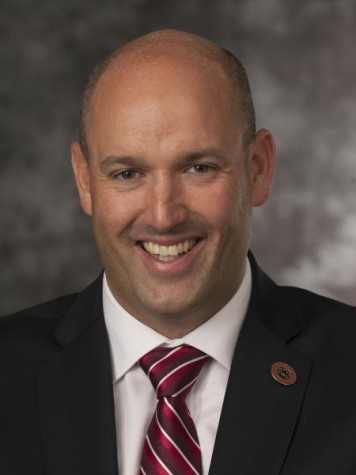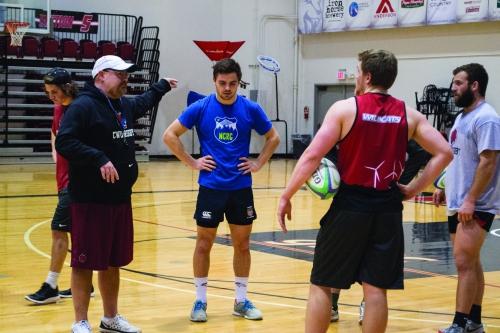Rugby’s road to recognition
January 28, 2016
Part one of our two week series chronicling the rise of Central’s rugby program. Part two can be read here.

Central’s rugby team gets set for a scrum against Boise State.
When the rugby program was elevated to varsity status on Feb. 26, 2014, it felt somewhat redundant.
For more than a decade, Central’s most competitive sport had been men’s rugby, which had competed at the collegiate club level since 1972. During that time it racked up a string of league championships and impressive victories.
The only difference now is that the program is finally being treated as such money-wise.
Central has budgeted roughly $750,000 a year to be spent on men’s and women’s rugby, nearly equally split.
The promotion to varsity also allowed Central to retain one of the world’s premiere coaches—Tony Pacheco, men’s head coach since 2010.

Pacheco had been offered a coaching spot on the U.S. National Rugby team, but elected to stay and continue running Central’s program. Coordinator of Collegiate Sports Clubs Corey Sinclair said school policy forbids paying club coaches from sport club funds.
So for four years, Pacheco—whose reputation in the rugby world is a primary selling point in attracting recruits—was a “volunteer” for Central. He paid his bills by working as an appraiser from 2006 to 2014 for a company owned by former Wildcats’ rugby coach Jason Ray, who coached the Wildcats during the 1990s and early 2000s,
That all changed last year. Central paid Pacheco $67,600 for the 2014-15 season, and was scheduled to pay him $70,677 for the 2015-16 school year.
“Pacheco said, ‘No. I like it here. I want to stay here,’ ” said Central Athletics Director Dennis Francois. “ ‘But if I’m really going to do this and take us to the next level and keep it strong, I have to do it on a full-time basis. I can’t be doing my regular day job and coming here. It will kill me.’ ”
The promotion to varsity status also helped recruit Mel Denham, a member of the women’s USA Rugby national team, to coach Central’s women’s team.
With the men’s team already a dominant force and the women’s team breaking through as a national title contender, the rugby program has benefits on and off the pitch, Francois said. Every new athlete who comes to play rugby for the Wildcats adds money to Central’s coffers.
“From a business perspective, there’s increased tuition, even though we give scholarship money, but it’s minute compared to 30 new bodies on this campus,” Francois said.
The men’s team is coming off its third-straight semifinal appearance in the Varsity Cup post-season championship. Together with Pacheco’s reputation and the extra support that varsity-status provides, expectations are high.
“I hope both the men and women will be raising national championship banners, creating All-Americans, national team players and Olympians,” Pacheco said.
Players such as Aladdin Schirmer, Patrick Blair and Tim Stanfill have excelled after graduating. Schirmer has played for the USA Falcons national team. Blair and Stanfill both have gone on to play for the Seattle Saracens pro team.
“Where the program is now is on the shoulders of all the guys before them,” said former Central rugby coach Bob Ford, now the university’s senior director of Alumni & Constituent Relations . “And what they’re going to achieve because of that is going to be unprecedented.”
Central’s combined budget for the 2015-16 athletics season for football, women’s volleyball, and men’s and women’s basketball is close to $1.6 million. The rugby program has been allocated a $390,214 budget—$194,126 for the men and $181,088 for the women — for the current 2015-16 fiscal year.
It begs the question: Can this money be spent better elsewhere or is the exposure on a national scale worth the cost?
“Public Affairs began providing support to this club sport for a reason—the ability to reach hundreds of thousands, possibly millions, of people and make them aware of this university,” said Linda Schactler, chief of staff and executive director of Public Affairs. “Rugby’s place on the national stage provides social media, sports news and other coverage we could never afford to buy.”
Ray, Ford build a program
Under Jason Ray, who coached the men’s team from the 1990s into the 2000s, the Wildcats’ men’s team advanced to the Round of Four and developed a recruiting pipeline from the Kent area, where Pacheco was recruited from and where some of the top national prospects over the last decade have graduated.

Robert Ford coached the men’s rugby team from 2002-2010 as a volunteer. He came to work for the SURC and is now the senior director of Alumni & Constituent Relations
Ray was also responsible for luring Robert Ford to the program.
Ford played rugby at Western Washington University and was in the graduate program at the time. Ray called Ford to tell him a position had opened in the SURC at Central. Ford was hired as the associate director of University Recreation and began working in November of 2002.
“They were just starting the development of the SURC design, and so, having served as graduate student in the design of the facility at Western, it was a perfect opportunity,” Ford said.
Ford said he had no intention of taking over as rugby coach when he arrived on campus; he thought of it as an opportunity to split responsibilities with Ray and help build the program into a national contender.
But when Ray stepped away from the program soon after he had children, Ford filled his spot as head coach.
Because he never had a coach during his own career, Ford said he understood the value of leadership and wanted to give back to the sport.
It was Ford’s work as coach from 2002-10 that raised the program from being a “standard club-type program” to a “competitive-type program,” Central Athletics Director Dennis Francois said.
Through over a decade of coaching, Ford managed to juggle both his full-time job and coaching the Wildcats, which was unpaid.
In Ford’s first year as head coach of the Wildcats, while also serving in his new SURC position, the team went undefeated. But the next season, after graduating 23 seniors—the largest class in rugby’s history—Central went 0-9 in 2003-04. The following year it was critical to turn things around.
“I started really heavily recruiting throughout the Northwest, and becoming involved in the All-Star process, and we turned the corner,” Ford said. “I don’t think we’ve ever looked back.”
The team recovered in the 2005-06 season with a second-place finish in the Northwest Collegiate Rugby Conference. The Wildcats have been league champions every year since. In 2007, Ford served as the U.S. National Team manager when it went to the World Cup. His Pacific Coast All-Star team also won five of six national championships.
Pacheco transforms program into a national powerhouse
Head coach Tony Pacheco should be credited for taking the men’s rugby program from the regional powerhouse it was to the national contender it is, according to Robert Ford, Central’s senior director of alumni and constituent relations and the coach of the men’s rugby team from 2002-2010.

Head coach Tony Pacheco, a former Central rugby player, coaches his team during a practice this winter.
Pacheco joined the program in 2007 and coached alongside Ford as volunteers.
Despite not being able to cash in on their efforts as coaches, Pacheco and Ford’s resolve remained strong. Both had full-time jobs while running the program at the club level.
Ford was the Interim Director of University Recreation from 2010 to 2012, then Director of Campus Life from 2012 to 2014, while Pacheco was a real estate appraiser for a company owned by former coach Jason Ray from 2006 to 2014. He was also a graduate assistant in the athletics department from 2010 to 2012, where he performed administrative duties and was also entitled to a tuition waiver and a $9,000 stipend.
Ford started his current position as Senior Director of Alumni and Constituent Relations in October of 2014.

Ford and Pacheco’s presence on the national and international stages drew players such as Patrick Blair—a future two-time USA Rugby Collegiate All-American—and Tim Stanfill, who currently plays for the Seattle Saracens. The team’s success also drew the attention of scouts.
Ford stepped away from the program when he decided to focus more of his attention on his daughters Carly and Camila.
“When [Pacheco] got involved, it opened it even more,” Ford said. “Certainly we had guys who went on at the All-American level, but to get guys breaking into the national team, Patrick Blair was really the first to do that. A big part of that is winning consistently and having the systems and having guys playing at the highest level of rugby day in and day out.”
Blair and Stanfill got all the attention they ever needed when the Wildcats won the Las Vegas Invitational in 2011, which advanced them to the USA Rugby Sevens national championship in Philadelphia, which was aired on NBC.
“That was a wakeup call for a lot of people,” Pacheco said.
Ford agreed. “That NBC opportunity that came with the 7s really exploded,” he said. “That’s where guys like Tim Stanfill got a look.”
Both Blair and Stanfill have gone on to play rugby professionally.
Pacheco now likens his position to being part coach, part salesman. “I am selling myself, the campus, the program,” he said. “We have to make sure it is the right fit for them. We wanted to sell them on our goals of being national champions.”
Shrewd recruiting helps
During Bob Ford’s coaching career, from 2002 to 2010, his recruiting tactics were straightforward and effective.
“Do you recruit white-collar, silver spoon [guys] or blue-collar, hard-worker, boot-strap guys?” Ford recalled thinking. “I kind of looked for guys who have chips on their shoulders that want something to prove. Maybe the guys who finished second in the team championships or didn’t quite achieve their goals and still have a fire in their bellies.”
Ford also pitched the type of opportunity Central offered, considering the sport’s popularity among students. Ellensburg is also a safe environment.
Ford once recruited five athletes from East Palo Alto, Calif., while attending the North American 4 Series. Only one of the five took Ford up on the offer to come to Central. In the four-year span the student played for the Wildcats, two of his friends were killed, while the other two were imprisoned—one of whom was sentenced to life.
“Talk about life-changing,” Ford said. “I think it’s about those types of experiences that you get by getting out of your circumstance and getting somewhere else. It isn’t about coming here because we’re the best and only, it’s about coming here because we’re the right fit.”
Ford worked hard at flipping a problematic stigma that is attached to rugby to make the program as focused and driven as possible.
“We weeded out a lot of what a lot of people would call ‘the American rugby scene,’ which is a lot of drinking and partying,” Ford said. “We did a lot of work to get rid of that culture. I think that changed the overall seriousness of the team and the way we competed.”
Coming next week:
- Women’s road to success
- The need for proper facilities
- Lucrative contract with Serevi Rugby
